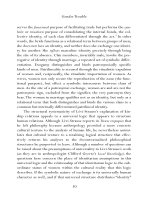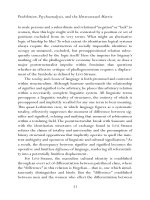GENDER TROUBLE 132
Bạn đang xem bản rút gọn của tài liệu. Xem và tải ngay bản đầy đủ của tài liệu tại đây (20.41 KB, 1 trang )
Prohibition, Psychoanalysis, and the Heterosexual Matrix
what, if anything, the claim to universality might imply about the
meaning of social processes.47 To claim that a law is universal is not to
claim that it operates in the same way crossculturally or that it determines social life in some unilateral way. Indeed, the attribution of universality to a law may simply imply that it operates as a dominant
framework within which social relations take place. Indeed, to claim
the universal presence of a law in social life is in no way to claim that it
exists in every aspect of the social form under consideration; minimally, it means that it exists and operates somewhere in every social form.
My task here is not to show that there are cultures in which the
incest taboo as such does not operate, but rather to underscore the
generativity of that taboo, where it does operate, and not merely its
juridical status. In other words, not only does the taboo forbid and dictate sexuality in certain forms, but it inadvertently produces a variety
of substitute desires and identities that are in no sense constrained in
advance, except insofar as they are “substitutes” in some sense. If we
extend the Foucaultian critique to the incest taboo, then it seems that
the taboo and the original desire for mother/father can be historicized
in ways that resist the formulaic universality of Lacan.The taboo might
be understood to create and sustain the desire for the mother/father as
well as the compulsory displacement of that desire. The notion of an
“original” sexuality forever repressed and forbidden thus becomes a
production of the law which subsequently functions as its prohibition.
If the mother is the original desire, and that may well be true for a
wide range of late-capitalist household dwellers, then that is a desire
both produced and prohibited within the terms of that cultural context. In other words, the law which prohibits that union is the selfsame
law that invites it, and it is no longer possible to isolate the repressive
from the productive function of the juridical incest taboo.
Clearly, psychoanalytic theory has always recognized the productive function of the incest taboo; it is what creates heterosexual desire
and discrete gender identity. Psychoanalysis has also been clear that
the incest taboo does not always operate to produce gender and desire
97









